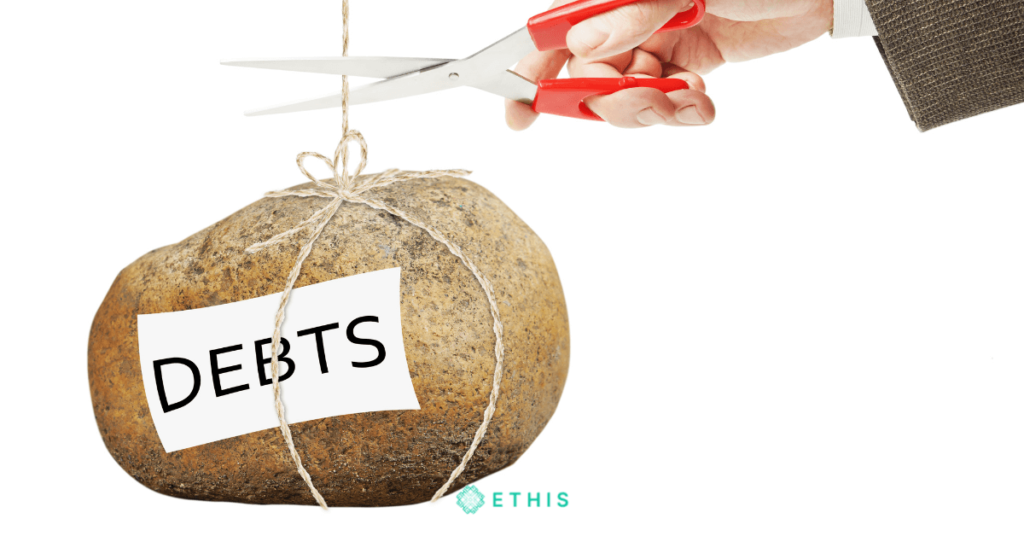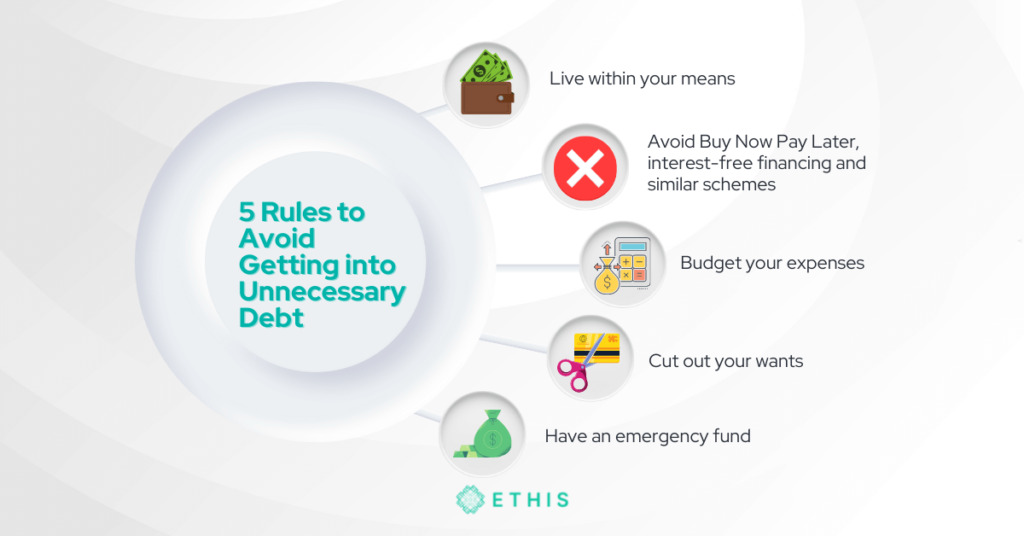
Some debt is necessary to build your credit score. Having a good credit score is important as it demonstrates your history of paying your debt to entities that loan you money. For most people, taking on loans is the only way they can afford to purchase basic necessities in life. House mortgage and car loans, for example, are two of the most basic debts that are hard to escape in today’s modern world.
However, unmanageable debt can take a toll on a borrower’s life. The best way to practice good money management is to stay out of unnecessary debt altogether. Follow these rules to avoid falling into a hole of unnecessary debt!
1) Live within your means
If you can’t afford to buy it without using your credit card, it means you don’t have enough money to buy it. So don’t buy it.
One of the most dangerous approaches to having a credit card is living under the illusion that you can afford things you actually don’t. It’s easy to just swipe your credit card and pay with your ‘future’ money. But before you realise it, you already owe hundreds or even thousands of Ringgits on your credit card that you can’t easily repay. Don’t fall prey to the credit card trap.
Live within your means and always pay with the money you already have.
2) Avoid Buy Now Pay Later, interest-free financing, and similar debt schemes


Buy Now, Pay Later (BNPL) is exponentially becoming a popular payment option, especially for online shopping platforms. It’s a type of short-term financing that allows consumers to make purchases and pay for them at a future date, often interest-free.
Using BNPL financing may seem like a convenient and safe option, especially when the term ‘interest-free’ is thrown around. But in essence, it’s a payment method that only lures you into debt. Don’t let BNPL entice you into spending money that you don’t really have.
The costs of borrowing can spiral if you fail to pay it on time. There are late payment charges and extra charges for rescheduling payments. The charges vary from one provider to another but at the end of the day, they exist to make money out of their business. So be a savvy consumer and always think of your finances first.
Related: Is buy now pay later shariah-compliant?
3) Budget your expenses
When it comes to finances, budgeting is crucial. Budgeting is the process of creating a plan on how to spend your money. A basic principle of budgeting is making sure your monthly spending does not exceed your disposable income. This spending plan is called a budget. Everything is clearer when you set a budget.
By budgeting your monthly expenses, you can clearly track where your money is going and what you can afford to spend on. It imposes spending limits on yourself. Without it, you may spend excessively, bringing your cash flow to negative, and consequently, fall into debt.
Always track where you are spending and spend within your budget.
Related: 7 Money Management Tips to Improve Your Personal Finance



4) Cut out your wants


Needs are generally your basic living expenses, things necessary for your health, or expenses that are required for you to do your job, raise your children, and support your family. Wants are things you choose to buy to improve your life and live more comfortably but are not a necessity.
Though human basic needs are more or less the same, one’s needs versus wants to vary from person to person depending on their health conditions and other factors. A car, for instance, is a need for most people but a luxurious car, no matter how rich a person is, will always be a want. A family car, on the other hand, could be a need for a big family but is a want for a small family.
Wants are not inherently bad. If you can afford it, you don’t need to restrict yourself from getting it. A want that leads you to debt is the one that you need to avoid. It will hurt your personal finances in the long run. It’s this kind of spending that you need to cut out early before it becomes a lifestyle.
5) Have an emergency fund
An emergency fund is your money that’s been set aside for emergencies. It’s a ‘lifesaver’ if you are hit with an unexpected event. The money will allow you to cover the unexpected expenses that come up without going into debt. Think of it as a protection plan that you can cash out hassle-free in times of emergency.
The best practice when trying to build up your emergency fund is to have at least 3 to 6 months of your salary saved up. Having a sufficient emergency fund, especially in an uncertain time like during this COVID-19 pandemic, is vital. It helps you to be financially prepared for what may come your way.
The bottom line – avoid getting into unnecessary debt


It is challenging to cut out your wants and live within your means if you are used to a certain lifestyle that costs more than what you earn, but strangling yourself with unnecessary debt is not worth it.
Focus on cultivating good money management habits. You have no one to be thankful for but yourself should rainy days come and you are prepared to face it financially. Unexpected events can occur to anyone, and working towards financial wellness should be just as much a priority as looking after your physical health.
If you have saved enough money for emergencies and are looking for ways to grow your money, check out ethis.co. We make it easy for you to diversify your funds into profitable SME financing in Indonesia and promising ethical Malaysian companies with high growth potential via peer-to-peer (P2P) lending and equity crowdfunding.





Top Posts
Islamic P2P Crowdfunding Explained
How to Earn Halal Money? The Money Mindset
Halal Investments for Singapore Muslims? It’s time for a shake-up in the Islamic Investments scene.
Smart investment for making Halal money
3 Reasons Why Property Crowdfunding is the Smart Investment for You